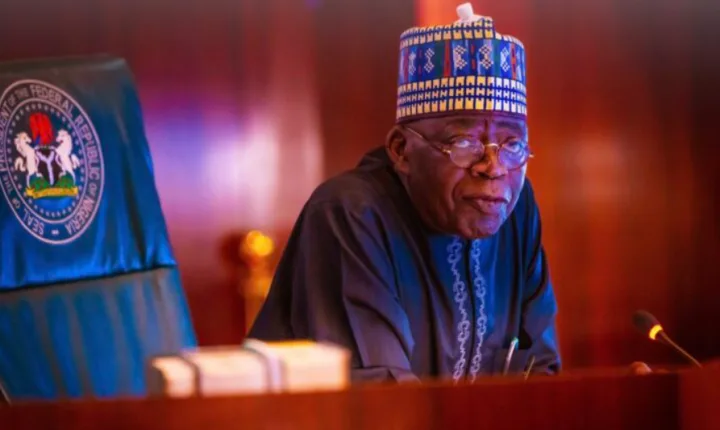President Bola Ahmed Tinubu has requested the approval of the National Assembly to secure a ₦1.15 trillion domestic loan to bridge the funding gap in the 2025 national budget, a move aimed at sustaining critical government operations and infrastructure projects amid fiscal pressures. The proposal, submitted to lawmakers this week, forms part of the administration’s broader strategy to address Nigeria’s persistent budget deficit while managing debt sustainability concerns.
According to government sources, the domestic borrowing plan is expected to help finance priority expenditures outlined in the 2025 Appropriation Bill, which emphasizes economic recovery, infrastructure renewal, and social welfare expansion. The Ministry of Finance explained that the loan will be sourced from the domestic capital market to reduce exposure to foreign exchange volatility and external debt risks.

President Tinubu, in his communication to the National Assembly, emphasized that the borrowing would be managed within the government’s medium-term debt framework, ensuring that it remains consistent with Nigeria’s fiscal sustainability goals. He also reaffirmed his administration’s commitment to increasing non-oil revenues through enhanced tax collection and economic diversification to reduce future dependence on borrowing.
“The domestic loan request is a strategic component of the 2025 fiscal plan designed to ensure timely implementation of key projects and maintain macroeconomic stability,” the statement from the Ministry noted. “It reflects our resolve to strengthen fiscal discipline and promote inclusive growth while meeting our developmental obligations.”
The 2025 budget, which has a projected expenditure of over ₦35 trillion, carries a significant deficit due to reduced oil revenues, exchange rate adjustments, and increased spending on social programmes, energy, and infrastructure. The ₦1.15 trillion domestic borrowing request is part of a larger financing package that includes external loans, public-private partnerships, and improved revenue mobilization efforts.
Economic analysts have described the move as a pragmatic step toward ensuring the continuity of governance, though they warn that the growing debt burden remains a pressing concern. According to the Debt Management Office (DMO), Nigeria’s total public debt stood at over ₦97 trillion as of mid-2025, with domestic debt accounting for more than half of the total.
Financial expert Dr. Tunde Abayomi observed that while domestic borrowing may appear less risky than external loans, the government must balance its fiscal strategy carefully to avoid crowding out private sector credit. “Borrowing domestically helps reduce exposure to foreign currency shocks, but it also increases pressure on interest rates and limits funds available to businesses,” he said. “The government must complement borrowing with aggressive revenue reforms and efficient spending.”
The Tinubu administration has defended the borrowing plan, arguing that it aligns with its “Renewed Hope Agenda,” which seeks to stimulate growth, enhance job creation, and reduce poverty through targeted investments. The government insists that the funds will be channelled into key areas such as transportation, energy, agriculture, healthcare, and education.
A senior official in the Budget Office explained that the 2025 fiscal framework was developed to balance fiscal responsibility with developmental imperatives. “The domestic borrowing will provide the liquidity needed to execute vital projects without derailing the economy. The focus is on productive spending that generates economic returns,” the official stated.
Lawmakers have expressed mixed reactions to the borrowing request. Some members of the National Assembly’s Finance and Appropriation Committees have urged the executive to prioritize debt servicing and improve fiscal transparency before contracting new loans. Others, however, have acknowledged the need for temporary borrowing to fund essential projects and avert economic stagnation.
Hon. Ibrahim Lawal, a member of the House of Representatives, noted that while borrowing is not inherently negative, accountability must remain central. “If properly managed and channelled into productive sectors, domestic loans can stimulate economic growth. But Nigerians must see the impact of every borrowed naira in improved infrastructure, job creation, and social welfare,” he said.
The borrowing request comes at a time when Nigeria is grappling with high inflation, exchange rate fluctuations, and revenue shortfalls. Inflation climbed above 30% in recent months, driven largely by food prices and energy costs, while the naira’s volatility continues to affect fiscal planning.
To cushion the economic impact, the Federal Government has intensified efforts to expand the tax base, enhance efficiency in public spending, and strengthen the operations of the Federal Inland Revenue Service (FIRS) and the Nigerian Customs Service (NCS). Recent fiscal reforms, including the ongoing tax and subsidy restructuring, are expected to improve revenue generation and reduce the country’s borrowing needs over time.
In response to concerns about Nigeria’s rising debt profile, the DMO has reiterated that the country’s debt remains within sustainable limits, provided that borrowed funds are deployed for capital projects that yield long-term economic benefits. The agency also noted that the government’s debt-to-GDP ratio is still below the 40% threshold recommended by international financial institutions.
However, critics argue that without significant improvements in public finance management, the continuous reliance on borrowing may not yield the desired outcomes. Civil society groups and policy advocates have called on the government to enhance transparency, cut wasteful expenditures, and publish regular reports on the utilization of borrowed funds.
As the 2025 fiscal year approaches, the success of Tinubu’s economic strategy will likely depend on the administration’s ability to strike a delicate balance between fiscal expansion and debt sustainability. The ₦1.15 trillion domestic borrowing proposal, if approved, will serve as a crucial instrument for funding national priorities, but its long-term impact will hinge on prudent management and tangible economic outcomes.
Support InfoStride News' Credible Journalism: Only credible journalism can guarantee a fair, accountable and transparent society, including democracy and government. It involves a lot of efforts and money. We need your support. Click here to Donate
